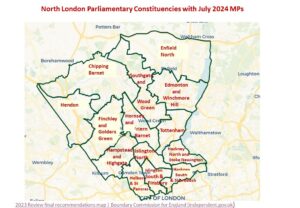The Labour Party Manifesto can be downloaded from here The Institute for Government has analysed the Labour manifesto with 10 things we learned from the Labour manifesto.
‘Make Britain a clean energy superpower’ is the main mission related to climate and environment. It includes:
- Net Zero Commitments promises to “get Britain back on track to meet our climate targets” and charge for carbon at borders to protect British industries from foreign ‘dumping’ as we decarbonise.
- Energy and Financing Strategy promises energy independence ‘from dictators like Putin’ with a new Energy Independence Act. The new low carbon energy, deploying local energy production, will be enabled by Great British Energy, capitalised by £8.3bn and partnering with industry and trade unions….. Labour plans to allocate:
– £1.8 billion to upgrade ports and build supply chains across the UK
– £1.5 billion to new gigafactories so our automotive industry leads the world
– £2.5 billion to rebuild our steel industry [low carbon]
– £500 million to support the manufacturing of green hydrogen.
– £1 billion to accelerate the deployment of carbon capture
Funding will be freed up by an increased windfall levy and removal of subsidies and generous investment allowances for oil and gas companies. Security of supply would be provided by a strategic reserve of gas power stations; long-term energy storage (inc green hydrogen) and a ‘phased and responsible transition in the North Sea’ with no new licences to explore new oil or gas fields.
- Electricity Sources and Infrastucture Labour would work with industry to upgrade the national transmission infrastructure, deal with grid connection obstacles and ‘rewire Britain’. Increased low carbon energy would come from double onshore wind, triple solar power, and quadruple offshore wind by 2030, investing in carbon capture and storage, hydrogen and marine energy; nuclear increase, and banning fracking for good. Local Area Energy would be planned with Great British Energy partnering with energy companies, local authorities, and co-operatives, with communities invited to come forward with projects, and work with local leaders and devolved governments.
- Industry A National Wealth Fund would support the most energy intensive sectors to decarbonise and Britain’s automotive and steel industries would be supported to decarbonise.
- Jobs – 650,000 new high-quality jobs, would be created, helped by a British Jobs Bonus, of up to £500 million per year to incentivise firms who offer good jobs. The North Sea would be managed in a way that did not jeopardise jobs, with offshore workers transitioning to the industries of the future.
- Consumers would benefit from a £6.6 billion investment to upgrade five million homes. Banks and building societies would provide further private finance to accelerate home upgrades and low carbon heating and the Warm Homes Plan would offer grants and low interest loans to support investment in insulation and other improvements such as solar panels, batteries and low carbon heating to cut bills. Standing charges would be reviewed for reductions.
- Environment – water companies would be forced to clean up rivers; nine new National River Walks would be created; millions of trees would be planted and new woodlands created. Labour would expand nature-rich habitats such as wetlands, peat bogs and forests and produce a land-use framework, making environment land management schemes work for farmers and nature. Labour would reduce waste by moving to a circular economy.

